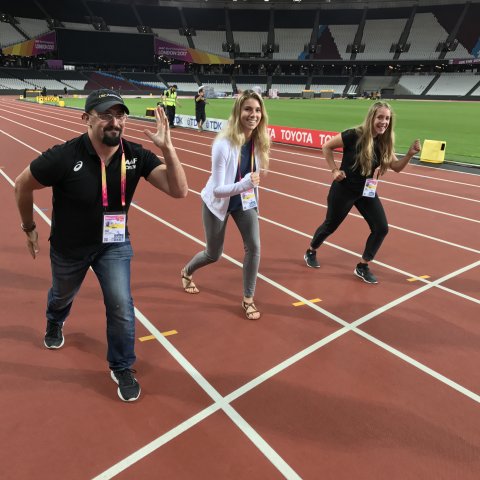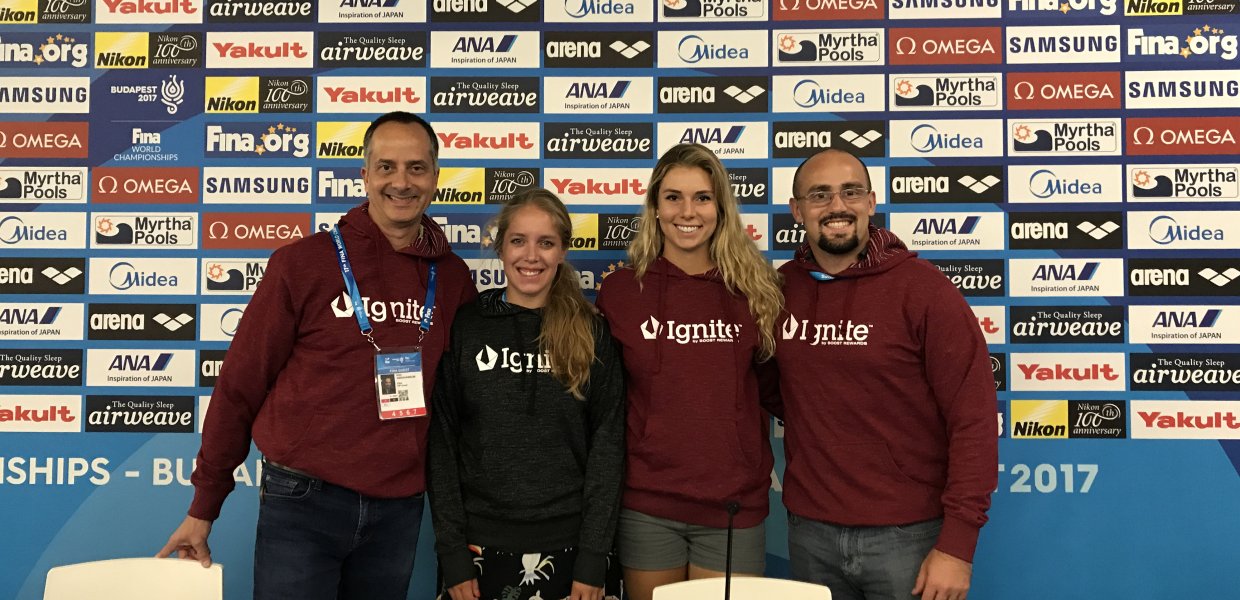The U.S.-led boycott of the 1980 Moscow Olympics kept Alan Abrahamson from covering the Games. He had just earned his undergraduate journalism degree from Northwestern University and had prepared by studying Russian.
Undeterred, Abrahamson decided he was still going to make it to the Olympics — someday.
The three-time Emmy award-winning sportswriter has served as columnist for NBC Olympics, NBC Sports and Universal Sports. Prior to that, he was a staff writer for 17 years at the Los Angeles Times. The 2018 Olympics in PyeongChang, South Korea, will be his tenth Games, Winter and Summer.
“I think the Olympic movement is a unique force in our world. It is complex and it is flawed,” Abrahamson said. “But we as human beings are flawed and those flaws keep me in a job because it gives me something to write about.”
As a veteran news reporter, Abrahamson, associate professor of professional practice, wanted to share his knowledge of sports journalism with his students and also expose them to the Olympic environment, giving them an opportunity in the summer of 2017 to gain hands-on experience.
“We needed to have a pilot project,” Abrahamson said. “Thus, this initiative came about.”
Abrahamson spent a year putting together the month-long program with the LA84 Foundation and other entities that provided support for students to attend, report and write stories about athletes competing in Olympic-style championships. He took three journalism graduate students to the FINA World Championships in Budapest and the IAAF World Championships in London — that is, the aquatics championships followed immediately by track and field.

In London, a highlight for Dodge, a first-year M.S. journalism student, was interviewing Christian Coleman, who earned a silver in the 100-meter dash. “He’s the only person to go 2-0 against Usain Bolt, so he’s definitely an up-and-coming, promising guy,” Dodge said, adding, “But if you were an insider, you knew this guy is going to be a star.”
Olivia Sandusky, who is in her first year of Annenberg’s M.S. journalism program, shared her favorite story: Naomy Grand’Pierre, a 20-year-old from Haiti, started swimming because three of her cousins drowned when she was a child.
The article that featured Grand’Pierre’s swimming career ended up going viral within the Haitian community and received 40,000 shares on Facebook. “When you look at it from the outside in, you’re just looking at a sporting event,” Sandusky said. “Maybe you’re not thinking about these deeper-level issues. The trials that some of these people go through to play their sport are really touching.”
Jolene Latimer, who is in the Master of Specialized Journalism program, said her thesis project about teen social media influencers was inspired by her work in Budapest and London. It was this experience, along with Abrahamson’s mentorship, she said, that fueled her pursuit to become a sports journalist.
“Sports journalism is not just about who won or lost a game. It can be a pathway to talk about really important things — like women’s health and refugees,” Latimer said. “These are all stories I would have wanted to pursue apart from sports, but sports has provided an accessible way to frame them.”
The students were put to the test. “The three of us were like the little team that went,” Sandusky said. Abrahamson prepared them, though. “He wanted us to reach a higher level in sports reporting and guided us to reach our maximum skills. If we ever had a problem, Alan was always there to give us not only journalism lessons, but life lessons.”
On top of meeting strict deadlines for FINA and IAAF, the students had to pitch stories, track down sources, get quotes and turn every story around quickly. “It was a lot of work, but I think it prepared me for what I’ll be facing in the work world,” Latimer said.
There were ferry rides home each night while reporting from Budapest and navigation mishaps in London. There were stories that focused on friendships and social inequities, and others that framed the fearless sport and the athletes who push to succeed. The students sometimes reported from nine in the morning to 10 o’clock at night — tired but anxious to finish their assignments.
“It’s not just about the game,” Sandusky said. “It’s about the athletes and their stories. There’s so many different issues in the world that you can share through the universal language of sports.”
Abrahamson, who also runs his own website, 3 Wire Sports, was described in James Patterson and Mark Sullivan’s novel “Private Games” as “the world’s best source of information about the [Olympic] Games and the culture that surrounds them.” Abrahamson will be teaching both undergraduate- and graduate-level sports journalism classes this spring. He also plans on taking the same three grad students to the 2018 Winter Olympics in South Korea.
